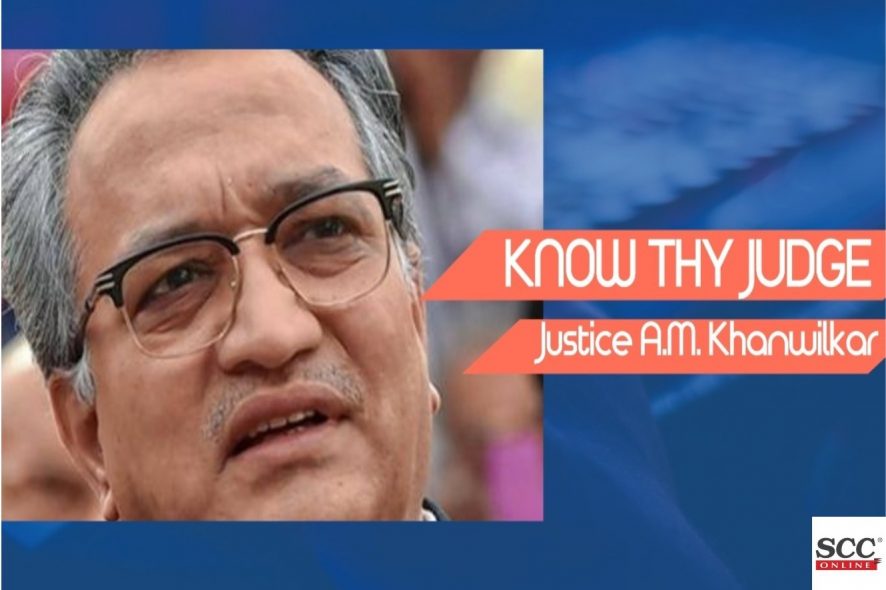As Justice A.M. Khanwilkar celebrates his 63rd birthday today; let’s have a look at his journey so far in shaping the justice system.
Here are some of the notable Constitution Bench judgments that Justice Khanwilkar has been a part of:
- Jindal Stainless Ltd. v. State of Haryana, (2017) 12 SCC 1: Justice Khanwilkar gave the majority opinion in the 7:2 majority Entry Tax verdict which upheld the validity of the entry tax imposed by the States on goods imported from other States. It was held that taxes simpliciter are not within the contemplation of Part XIII of the Constitution of India and that the word ‘Free’ used in Article 301 does not mean “free from taxation”. Read more
- Kalpana Mehta v. Union of India, 2018 SCC OnLine SC 512: A 5-judge bench held that Parliamentary Standing Committee Report or any Parliamentary Committee Report can be taken judicial notice of and regarded as admissible in evidence, but it can neither be impinged nor challenged nor its validity can be called in question. Read more
- State of Jharkhand v. Hindustan Construction Co. Ltd, 2017 SCC OnLine SC 1458: A 5-judge bench held that Supreme Court cannot entertain objections as the original court solely because it has appointed the arbitrator. Read more
- Government of NCT of Delhi v. Union of India, 2018 SCC OnLine SC 661: In the famous Delhi v. Centre case, the 5-judge bench held that the words “any matter” employed in the proviso to clause (4) of Article 239AA cannot be inferred to mean “every matter”. The power of the Lieutenant Governor under the said proviso represents the exception and not the general rule which has to be exercised in exceptional circumstances by the Lieutenant Governor keeping in mind the standards of constitutional trust and morality, the principle of collaborative federalism and constitutional balance, the concept of constitutional governance and objectivity and the nurtured and cultivated idea of respect for a representative government. The Lieutenant Governor should not act in a mechanical manner without due application of mind so as to refer every decision of the Council of Ministers to the President. Read more
- K.S. Puttaswamy v. Union of India, (2018) 3 SCC 797: The Supreme Court had quashed the order of Central Board of Secondary Education (C.B.S.E) asking the students to get themselves registered for National Eligibility-cum-Entrance Test (NEET) examinations by producing AADHAR numbers. The Court stated that “the students who intend to register in the said Board for NEET examination and for any other All India examinations, need not necessarily produce the Aadhaar number for the present, but they may be asked to produce any alternative identification number, such as ration card, passport, voter ID, driving licence and bank account.” Read more
- Public Interest Foundation v. Union of India, (2019) 3 SCC 224: A 5-judge bench bench made the disclosure of criminal antecedents by the contesting candidates mandatory and held that the disclosure of antecedents makes the election a fair one and the exercise of the right of voting by the electorate also gets sanctified. It has to be remembered that such a right is paramount for a democracy. A voter is entitled to have an informed choice. Read more
- Common Cause (A Registered Society) v. Union of India, (2018) 5 SCC 1: On 9th March 2018, a 5 Judge Bench comprising Chief Justice Dipak Misra and Justices A K Sikri, A. M. Khanvilkar, D Y Chandrachud and Ashok Bhushan held that the right to die with dignity is a fundamental right. An individual’s right to execute advance medical directives is an assertion of the right to bodily integrity and self-determination and does not depend on any recognition or legislation by a State. Read more
- Navtej Singh Johar v. Union of India, (2018) 10 SCC 1: In this case the constitutionality of Section 377 of the Penal Code, 1860 was questioned. On 6th September, 2018 the five-judge Bench partially struck down Section 377 of the Indian Penal Code, decriminalising same-sex relations between consenting adults. LGBT individuals are now legally allowed to engage in consensual intercourse. The Court had upheld provisions in Section 377 that criminalise non-consensual acts or sexual acts performed on animals. Read more
[Justice Khanwilkar’s picture credit: The Hindu]
SCC Online is now on Telegram and Instagram. Join our channel @scconline on Telegram and @scconline_ on Instagram and stay updated with the latest legal news from within and outside India







